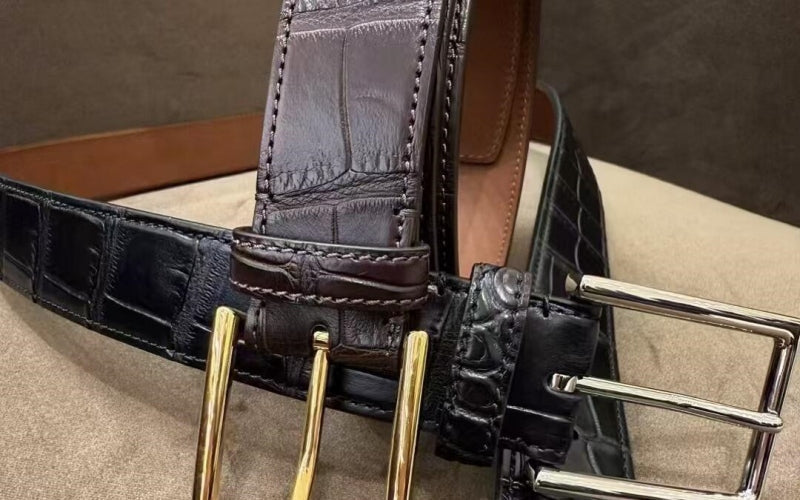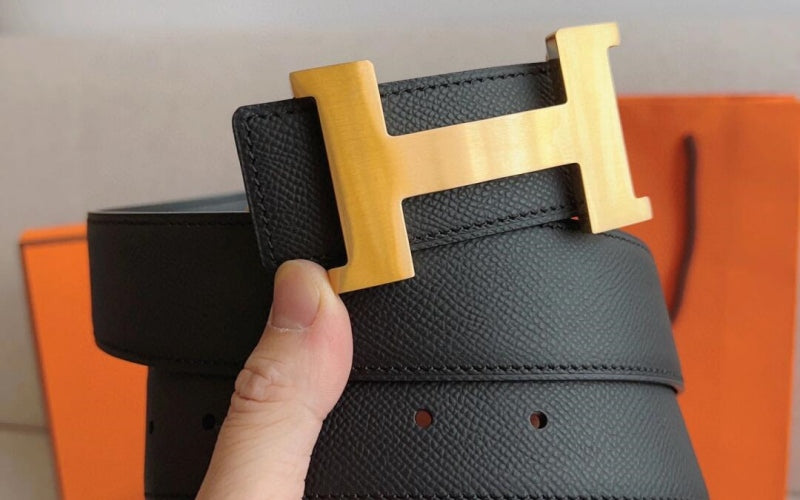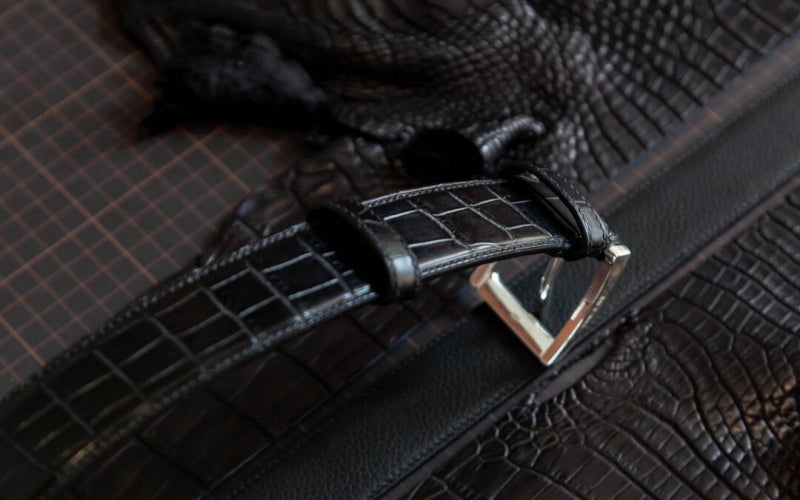
Are Alligator Leather Belts Safe? (Detailed Answer By BELTLEY)
So, you’re eyeing that sleek alligator leather belt—maybe online, maybe in a boutique where the salesperson speaks in hushed tones about "exotic craftsmanship." It’s gorgeous. It’s luxurious. It’s… ethically confusing?
Wait, are alligator belts even safe to wear? Is the alligator okay? Are you okay? Will wearing this thing summon PETA to your doorstep?
Relax. I’ve been there. As someone who once accidentally wore a vegan leather belt to a steakhouse (don’t ask), I get the moral whiplash of wanting to look sharp without feeling guilty.
Let’s unravel the mysteries of alligator leather belts, from ethical sourcing to whether they’ll survive a raucous night out. Spoiler: No alligators were harmed in the making of this blog post. (But seriously, let’s dive in.)
 Love this belt? Tap the pic above to check more alligator belts
Love this belt? Tap the pic above to check more alligator belts
1. What Exactly is Alligator Leather?
(Hint: It’s Not Just Fancy Gator Skin)
Alligator leather comes from—you guessed it—alligators, specifically the American alligator (Alligator mississippiensis) and the crocodile’s less murdery cousin. But here’s the kicker: not all "gator" belts are created equal.
-
Wild vs. Farmed: Most luxury alligator leather is farmed, not wild-hunted. Farms in Louisiana and Florida breed alligators sustainably, often as part of conservation programs.
-
The Skinny on Scales: Alligator skin has a distinct pattern of rectangular scales (called "tiles") and softer belly scales. The best belts use the belly—it’s smoother and more flexible.
-
Why It’s Pricey: Raising alligators is labor-intensive. It takes 3–4 years for a gator to reach harvest size, and tanning the hide requires precision.
Fun Fact: Alligator leather is tougher than cowhide but softer than ostrich. Think of it as the Goldilocks of exotic leathers.

2. The Ethics of Alligator Belts: Are You Supporting a Dinosaur’s Demise?
Let’s tackle the elephant (or alligator) in the room: Is this ethical?
The Conservation Paradox
In the 1960s, American alligators were nearly extinct due to overhunting. Today, they’re thriving—thanks partly to regulated farming. Here’s why:
-
Legal Protections: Alligator farming is governed by CITES (Convention on International Trade in Endangered Species). Farms must prove their practices don’t harm wild populations.
-
Economic Incentives: Local communities profit from farming, reducing poaching. In Louisiana, alligator eggs are harvested from the wild (with permits), incubated on farms, and 10–15% of hatchlings are released back.
Beltley’s Stance: We source from CITES-certified farms that prioritize humane treatment. No gators are harmed for fashion alone—they’re part of a broader conservation loop.
But What About the Gators?
-
Living Conditions: Reputable farms provide spacious pens, clean water, and veterinary care. (No, they’re not kept in bathtubs.)
-
Humane Harvesting: Euthanasia methods are regulated to minimize suffering. It’s strictly monitored—no Joe Exotic vibes here.
The Bottom Line: When done right, alligator leather is ethical. It’s fast fashion’s synthetic knockoffs you should side-eye.

3. Chemical Safety: Will Your Belt Give You a Rash (or Superpowers)?
You’ve seen The Toxic Avenger. You’re wondering: Does tanning alligator leather involve mutant ooze?
The Tanning Process
-
Chrome Tanning: Uses chromium salts. It’s quick and durable but can cause allergies in sensitive folks.
-
Vegetable Tanning: Uses plant tannins (oak, chestnut). Eco-friendly but pricier and less water-resistant.
-
Aldehyde Tanning: A newer, formaldehyde-free method that’s gentler on skin and the environment.
Beltley’s Secret Sauce: We use vegetable and aldehyde tanning. Our belts are free from harmful chemicals, so you won’t glow in the dark after wearing one.
Allergies & Sensitivities
-
Rare but Possible: Some folks react to dyes or finishes. Tip: Test the belt on your wrist before a full-day wear.
-
Break-In Period: Like new shoes, alligator leather might feel stiff at first. It softens with wear—no sandpaper needed.
 Love this belt? Tap the pic above to check more alligator belts
Love this belt? Tap the pic above to check more alligator belts
4. Durability: Will This Belt Outlive Your Marriages?
Alligator leather isn’t just a flex—it’s a workhorse.
-
Strength: Those diamond-shaped scales resist scratches better than cowhide.
-
Aging: Develops a rich patina over time. Think of it as the leather version of George Clooney.
-
Care Tips:
-
Conditioning: Use a reptile-leather conditioner every 6 months.
-
Storage: Keep it rolled, not folded. Alligator skin has memory (unlike your ex).
Pro Tip: Avoid water. Unlike crocodiles, alligator belts aren’t fans of pool parties.
 Love this belt? Tap the pic above to check more alligator belts
Love this belt? Tap the pic above to check more alligator belts
5. Legal Stuff: Can You Get Arrested for Wearing Alligator?
Short answer: No—if you buy responsibly.
-
CITES Certificates: Legit sellers provide documentation proving the leather was sourced legally.
-
Traveling: Some countries restrict exotic leather imports. Check local laws before packing that belt for Bali.
 Love this belt? Tap the pic above to check more alligator belts
Love this belt? Tap the pic above to check more alligator belts
6. Alligator vs. Vegan Leather: Which is Actually Greener?
Vegan leather sounds ethical, but most of it’s plastic (PU or PVC). Here’s the scoop:
-
Environmental Impact:
-
Alligator: Biodegradable, long-lasting. Farms support conservation.
-
Vegan Leather: Sheds microplastics, ends up in landfills.
The Verdict: If you’re eco-conscious, a well-made alligator belt beats fast-fashion vegan "leather" every time.
7. How to Spot a Fake Alligator Belt
Because “luxury” shouldn’t mean “peeling pleather.”
-
Check the Pattern: Real alligator has irregular, asymmetric scales. Fakes are too uniform.
-
Feel the Texture: Genuine gator skin is bumpy but smooth. Plastic feels… plasticky.
-
Price: Authentic alligator belts start around $500. If it’s $50, it’s 100% fake.
Beltley’s Authenticity: We laser-engrave our buckles and include authenticity cards. No sketchy back-alley deals here.
 Love this belt? Tap the pic above to check more alligator belts
Love this belt? Tap the pic above to check more alligator belts
8. The Ultimate Question: Should You Buy an Alligator Belt?
Yes if:
-
You want a timeless, durable piece.
-
You care about ethical fashion and conservation.
-
You’re okay with explaining “No, it’s not a crocodile” at parties.
No if:
-
You’re vegan or morally opposed to animal products.
-
You’re prone to losing belts in Ubers.
FAQs: Your Burning Questions, Answered
Q: Do alligators die just for belts?
A: No. Farms use the entire animal—meat for food, hides for leather.
Q: Can I wear an alligator belt in the rain?
A: Light rain? Fine. Monsoon? Skip it.
Q: How do I clean it?
A: Wipe with a damp cloth. No soap, no magic erasers.
Q: Is it worth the $$$?
A: If you want a belt that lasts decades and ages beautifully? Absolutely.
Why Beltley’s Alligator Belts Are a Cut Above
At Beltley, we’re obsessed with quality and ethics. Our alligator belts are:
-
Ethically Sourced: CITES-certified, farmed responsibly.
-
Handcrafted: Each belt is stitched by artisans, not machines.
-
Built to Last: We guarantee them for life (yours, not the alligator’s).
Check out our Alligator Collection—because you deserve luxury without the guilt.
Final Thought:
Wearing an alligator belt isn’t just about style—it’s about making mindful choices. And hey, if anyone gives you side-eye, just flash your CITES certificate and smirk.

